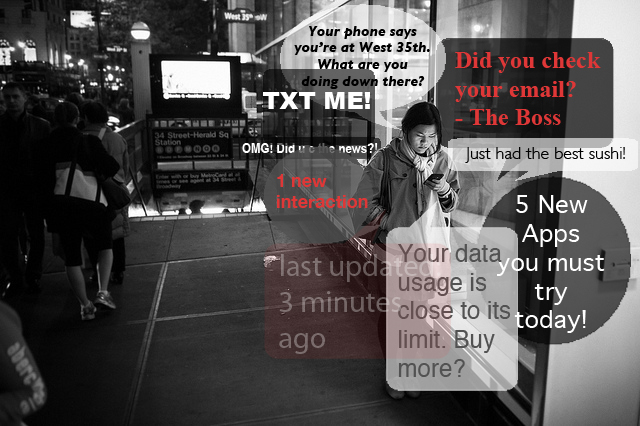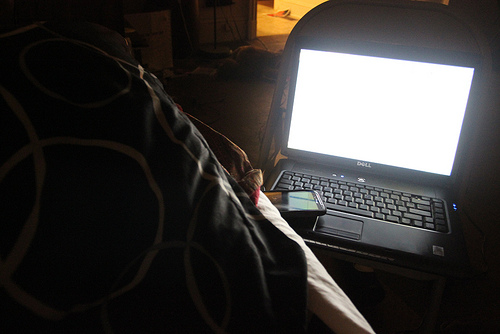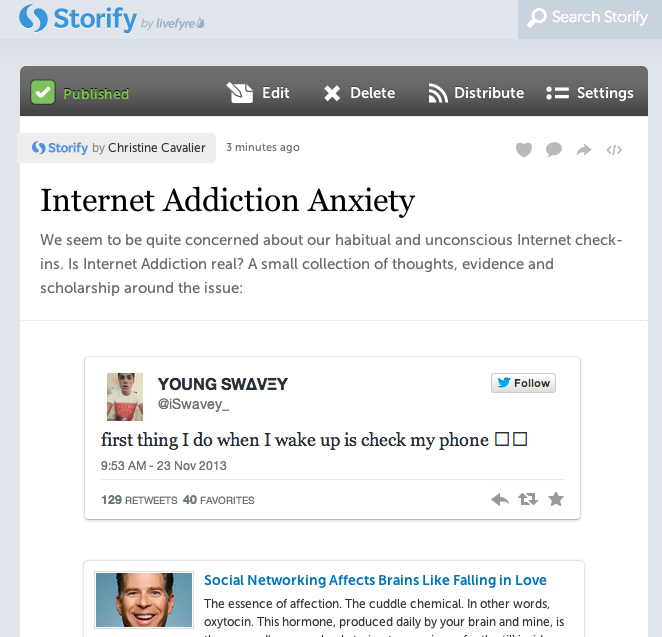THE INTERNET AS A DISTRACTION
My browser history is embarrassing
I lost a link last night. I needed to find the post before continuing with the book review I was writing. My Internet searches on the subject, which most times are quite fruitful (I rock the Boolean), were turning up bupkis. Desperate, I turned to paging through the browser’s search history.
I advise you: Never do this.
Nothing is more humbling than a trip down Browsing Memory Lane. Any self-respecting worker who beliefs herself a productive member of society will crumble when faced with the miles Upworthy, Buzzfeed, and Huffpo links in her web history. (Remind me to erase this evidence of my idiocy before I die.)
 What is it about the Internet that distracts us so thoroughly? Today we’ll dig a little deeper into what makes us click. And click. And click, until we fall asleep mid-tweet.
What is it about the Internet that distracts us so thoroughly? Today we’ll dig a little deeper into what makes us click. And click. And click, until we fall asleep mid-tweet.
I’m not alone
Raise your hand if you:
- check-in with email, Twitter, Facebook, etc. before you are dressed for the day
- update or read communication sites multiple times daily
- compulsively click on headlines with numbers (e.g. “5 easy ways to detail your car”)
- believe your boss expects you to be reachable 24/7
- feel left behind if you don’t know the day’s headlines
- fear for your safety if you are not near your phone
OK, you can put your hands down. Thanks for your participation. (For those of you who didn’t raise your hand, there’s a book for that.)
The good news and the bad news
Good news: Most likely you are not Internet addicted. Addiction has certain criteria and even the experts can’t agree on whether or not Internet Addiction really exists. Unless your life is severely disrupted by your Internet use, you are more likely “Internet Distracted” and you probably haven’t done permanent damage to your brain. A little knowledge of how behaviors generate may help you improve your daily life.
Bad news: New research has shown that the specific light waves from screens can affect sleep patterns, even if you haven’t looked at a screen for hours before bed. There isn’t sufficient research to tell us how screentime effects our moods or internal clocks throughout the day, but sleep deprivation’s harmful effects are well-documented (in fact, sleep deprivation is a very powerful torture technique). Even if the screen light isn’t affecting our moods, our bad habits are. Many of us report feeling less productive, more isolated and increasingly dependent on our Internet connection.
Let’s build our knowledge around Internet distraction in hopes that we can reverse whatever damage we’re doing to our lives. (We’ll talk about the more serious Internet Addiction in another post).
Why we fall down the rabbit hole
Our online time-wasting is caused and reinforced by the processes of habit formation and coping mechanisms.
Let’s look at the difference between a habit and a coping strategy.
What’s HABIT?
Habit is the response to a reoccurring scenario. As you run into the same situation repeatedly, you (usually subconsciously) form a response that works best. As that behavior keeps working, it becomes a habit. This all happens outside of your notice. This habituation can happen in the length of time anywhere between a few seconds to a few months; it all depends how frequently the scenario occurs in your life.
Can habits cause adverse brain effects? Yes, habits can change your brain. Habits cause the brain to form neural pathways that expedite the response desired. This makes sense, because your brain’s job is to regulate the body; it wants the body in stasis as much as possible. The brain builds response pathways so the body can get to stasis quicker.
While habits do affect your brain structure, these neural pathways can be dismantled and rebuilt just as easily as they were constructed (when I say “easy,” I mean by your brain’s standards. Breaking a habit is no easy task for us). The hard part is designing and repeating a scenario that our brain can respond to. We must create a reoccurring stimulus then craft a response that can eventually be carried out subconsciously. This, of course, is as hard as it sounds, but it can be done.
What’s COPING?
Coping is the act of neutralizing stressors. When the brain detects threats, it’s primary concern is to save the body from harm and get it back to stasis. The Fight/Flight response is the most famous coping mechanism, but there are endless numbers of coping strategies in the human behavioral repertoire. While people often use the same small number of strategies for all stressors, many times these strategies are enacted consciously and can be changed more easily than habits. (The comfort you get from the coping strategy isn’t easily changed, though. That’s where the pathways form – your brain builds fast-tracks to relaxation once the strategy is enacted and consistently works well).
Reaching for your phone first thing in the morning is a habit. Ranting online after a particularly bad day is a coping strategy. Habits are how you live your daily life. Coping skills are what you use to get back to normal when something disrupts your daily flow.
The Check-in Habit
The “check-in” is my term for the act of establishing one’s presence online, e.g. downloading, reading, or responding to email, updating one’s status in mass communication channels like Twitter or Facebook, allowing GPS tracking apps to broadcast your location, etc.
When is your first check-in of the day? Probably it’s first thing in the morning. When I ask people why, usually I get answers or excuses having to do with work, specifically, scheduling and tasks:
“I need to see if anything broke during the night.” “My clients expect me to be available 24/7.” “I check to see if any meetings are canceled so I can sleep more.”
Whether these reasons are based in fact or are justifications, they very likely have little to do with the origin of the habit. Because habits are formed unconsciously, no-one can pinpoint the moment their habit originated, which means it’s impossible to finger the true cause. This lack of explanation is quite disconcerting to humans, so we construct an explanation based on our world view/values. This is OK; it’s just a human trait. The problem is this: Habits with a story, like “My boss expects me to check-in when I get up,” are harder to break than others. Once we can accept that these stories are randomly generated, we can let go of beliefs that lock us into destructive behavior.
An endless loop
When life gets pressured, we recreate calming scenes. Because we have learned the rewarding and calming (or dulling) effect of the check-in, we now use it as a coping mechanism. Eventually, any small stressor launches the coping mechanism, and the coping mechanism itself turns into the habit of the check-in. We are constantly relying on surfing the Web to bring even the tiniest fight/flight response back into stasis. In the morning, we’re trying to shake ourselves awake while the coffee brews. What better way to get the brain moving than to make it read words and respond to them?
So the 1st check-in could have begun as a coping mechanism but it is definitely now a habit. The constant check-ins throughout the day could be either a coping mechanism, a habit, or both. This adds up to a whole heck of a lot of time on the Internet, and a strong, deeply-rooted behavior that is hard to modify.
Shock the monkey exercise to break your Internet habit
You need to become aware of your unconscious habits and stressors.
1. Think back to when you first had email, or your phone, or your first social media account. What about it kept you coming back to check-in? Write down 3 reasons.
2. When you got you got your phone, how did the first few days go with it? Write a 3 paragraphs explaining your 1st, 2nd and 3rd days with the new tech.
3. Imagine you have to train an extra-terrestrial in the nuances of your current daily actions. The ET asked you what the benefits are to the check-in. Write down those reasons. Do they differ in tone from the answers in Q1?
4. Track your check-ins for one day. I wish I had an app for you. Here is an InternetCheck-inSheet instead. Use 1 hashmark for each check-in/refresh of any social media communication method. Note the times of day. Tally up the “worst offenders” in frequency and time.
5. Take the app that was your worst offender and halve the number of check-ins. Construct a lifestyle rule and stick to it. e.g., “I only check Twitter after 12 pm.”
6. Construct more lifestyle rules for the other communication sites.
7. Live by your rules.
Since you are using the Web as a coping mechanism, you may find that as your Twitter usage decreases, your Reddit hours increase. This is to be expected. Fill the time with offline pursuits as much as possible. You may find your concentration lacking and your ability to focus for long amounts of time compromised. It’s OK. Keep at it. For times of minor stress (like sleepy-eyed mornings), find another coping strategy. You can incorporate stretching, play an analog game of solitaire, pick up a magazine, or splash cold water on your face. When you see your phone and you find your hand reaching for it, repeat your rule and your values to yourself: “I am not the kind of person that reaches for his phone first thing in the morning. I only check it when I am on the train to work.”
Once you get less screen light, more sleep, and longer periods away from the intermittent reward system of social networks, your concentration skills will increase.
2 Books about Internet distraction and habits I like
For more reading about habits, you can check out The Habit Loop: Why We Do What We Do In Life and In Business by Charles Duhigg. Mr. Duhigg covers the brain structures we talked about and arms the reader with an in-depth understanding on how to change his life. It’s more academic than it is self-help, but understanding the habit formation process is the most important part of breaking bad behavior cycles. (I don’t have any recommended reading about coping mechanisms at this time, because those books tend to be a bit academic in tone. I’ll link when I find a book worthy of a mass audience. Please send on your suggestions).
For more about using technology to help instead of hinder your concentration skills, read The Distraction Addiction: Getting the Information You Need and the Communication You Want, Without Enraging Your Family, Annoying Your Colleagues, and Destroying Your Soul by Alex Soojung-Kim Pang. Dr. Pang speaks of lessons from Buddhism and the apps that apply them to help us work online consciously and free of destruction. Dr. Pang doesn’t list this app in his book, but I’ve just started using ISOLATOR, and it’s helped me to keep my mind on task. These are the kinds of apps and practices Dr. Pang discusses.
Other related PurpleCar articles you may like:
Why You’re Addicted to the Internet
3 Surprising Ways to Overcome Internet Addiction
10 Signs You’re Addicted to the Internet (Humor)
Around the web:
See my friend Cecily’s account of severely reducing her social media use
Click on the pic below to be taken over to my Storify collection of articles, tweets and musings about our fear of Internet Addiction:
Photo credit: 1st photo Ben Thompson on Flickr (modified by me, Christine Cavalier). 2nd photo: Vivian D. Nguyen on Flickr 3rd Photo: my own screenshot of my Storify page



Comments on this entry are closed.
Amazing information here! I mean… SERIOUSLY! Great writing. I’m a victim of this drama.
Thanks, Joseph! We’re all victims of this drama, even if we aren’t the ones constantly checking-in. Car accidents, less productivity, etc., all from texting or being distracted affects us all. We must learn to compartmentalize and lessen the importance of constant connectivity in our lives.